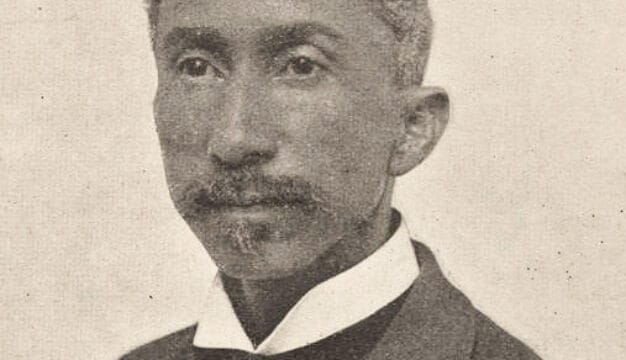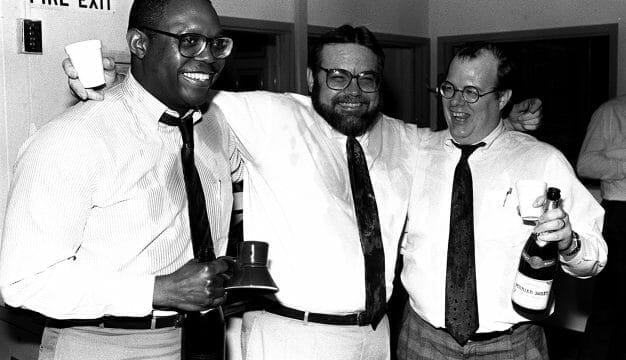Artur Davis
Artur Genestre Davis (1967- ) is a politician and lawyer who represented Alabama’s Seventh Congressional District in the U.S. Congress from 2003 until 2011. He made an unsuccessful run for governor in 2010, losing in the Democratic primary to Ron Sparks, the commissioner of agriculture. Davis left the Democratic Party after that loss and aligned himself with the Republicans, returning to the Democratic Party again in 2016.
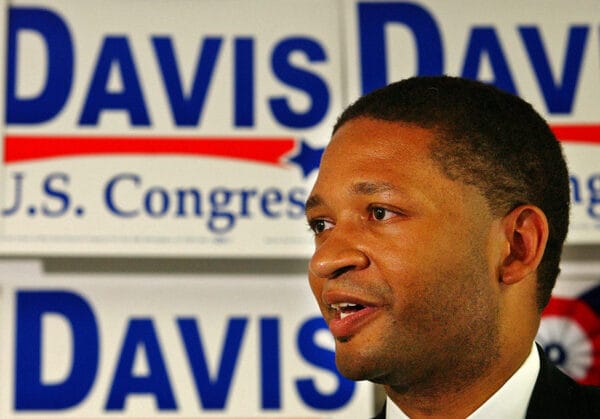 Artur Davis
Artur Davis (pronounced AR-tur) was born in Montgomery, Montgomery County, on October 9, 1967. Davis was raised by his divorced mother, who taught French, and his grandmother, his father having left the family when Artur was two. After graduating from Montgomery’s Jefferson Davis High School in 1986, Davis attended Harvard University in Cambridge, Massachusetts, and graduated magna cum laude in 1990; he then earned a law degree with honors from the Harvard Law School in 1994. During law school, he interned for Alabama Democratic senator Howell T. Heflin, U.S. District Court judge Myron Thompson, and the Southern Poverty Law Center. After graduating in 1994, Davis was employed as an assistant U.S. attorney from 1994 to 1998 and then had a brief stint with a Birmingham, Jefferson County, law firm.
Artur Davis
Artur Davis (pronounced AR-tur) was born in Montgomery, Montgomery County, on October 9, 1967. Davis was raised by his divorced mother, who taught French, and his grandmother, his father having left the family when Artur was two. After graduating from Montgomery’s Jefferson Davis High School in 1986, Davis attended Harvard University in Cambridge, Massachusetts, and graduated magna cum laude in 1990; he then earned a law degree with honors from the Harvard Law School in 1994. During law school, he interned for Alabama Democratic senator Howell T. Heflin, U.S. District Court judge Myron Thompson, and the Southern Poverty Law Center. After graduating in 1994, Davis was employed as an assistant U.S. attorney from 1994 to 1998 and then had a brief stint with a Birmingham, Jefferson County, law firm.
In 2000, Davis entered the race for Alabama’s Seventh Congressional District, which encompasses much of west-central Alabama, including the cities of Birmingham, Selma, and Tuscaloosa. Heavily Democratic and majority African American, it was represented by Democrat Earl F. Hilliard, who was notably the first African American elected to Congress from Alabama since Reconstruction. Davis fell five percentage points short of defeating Hilliard, but emboldened, Davis challenged Hilliard again, in 2002. The race proved to be very contentious. Hilliard openly questioned whether the younger, lighter-skinned, and Harvard-educated Davis was “black enough” to represent the district and accused him of accepting campaign contributions from Republican supporters and out-of-state donors. Davis in turn pointed out Hilliard’s poor legislative record, ethics violations, and a controversial trip to Libya after Congress had banned travel to the country. The strongly pro-Israel Davis also exploited the fact that Hilliard had accepted money from the Arab American Leadership Political Action Committee, voted against increasing U.S. military aid to Israel, and voted against resolutions condemning acts of terror committed by Palestinian nationals. Hilliard, however, was able to rally notable figures such as Martin Luther King III, activist Al Sharpton, and actor Danny Glover to campaign on his behalf. Davis, though lacking support from civil rights organizations, benefited from redistricting that had separated Hilliard from some of his supporters and had brought in more white voters. In a runoff, Davis won with 56 percent of the vote, making him one the few challengers to win a seat in that election cycle.
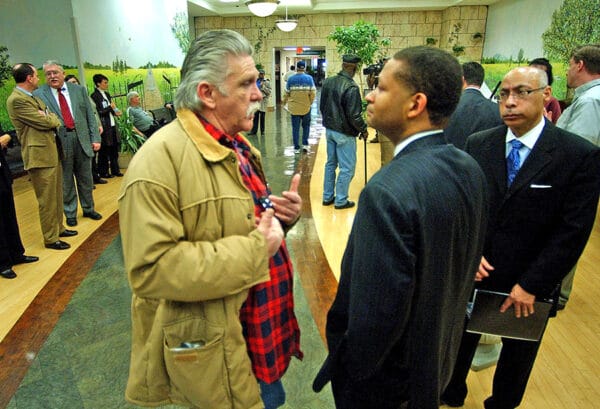 Artur Davis at VA Hospital
Davis served four terms in Congress and voted largely as a centrist, sometimes convincing large numbers of Republicans to support Democratic proposals, such as restoring funding for public housing and legislation creating the National Cord Blood Program. He served on several prestigious panels, including the House Judiciary Committee and the House Committee on Ways and Means. While serving on the Judiciary panel, Davis took an active role in defending former Alabama governor Don Siegelman, who was being investigated for bribery charges. Davis also was a member of the Congressional Black Caucus, played a leading role in the now-defunct Democratic Leadership Council (a coalition of moderate Democrats), and served on the Democratic Congressional Campaign Committee in 2006.
Artur Davis at VA Hospital
Davis served four terms in Congress and voted largely as a centrist, sometimes convincing large numbers of Republicans to support Democratic proposals, such as restoring funding for public housing and legislation creating the National Cord Blood Program. He served on several prestigious panels, including the House Judiciary Committee and the House Committee on Ways and Means. While serving on the Judiciary panel, Davis took an active role in defending former Alabama governor Don Siegelman, who was being investigated for bribery charges. Davis also was a member of the Congressional Black Caucus, played a leading role in the now-defunct Democratic Leadership Council (a coalition of moderate Democrats), and served on the Democratic Congressional Campaign Committee in 2006.
Although a centrist, Davis voted in favor of notable Democratic initiatives such as immigration reform, fair pay for women, and the 2008 economic stimulus package passed during the Great Recession. In Alabama, he helped secure federal disaster funds for the catfish industry in 2008 and served on Gov. Bob Riley‘s Black Belt Action Commission. However, several attempts during his congressional tenure to promote economic development in the Black Belt region died in committee. He married state government employee Tara Johnson in 2009; the couple have no children.
Davis gained national attention through his early support of 2008 presidential candidate Barack Obama, and he was the first member of Congress outside of Obama’s home state of Illinois to endorse the eventual president. The pair met while at Harvard and had stayed in contact. Davis campaigned for Obama in the state’s Democratic primary, in which Obama handily defeated Hillary Clinton, and later gave a high-profile speech at the Democratic National Convention. Obama’s success in the Democratic primary as well as winning the presidency helped convince Davis that Alabama was ready for an African American candidate for governor in 2010.
With the South’s new acceptance of multicultural candidates and his moderate voting record, Davis felt that he had a strong chance of success. He proposed raising taxes on out-of-state timber companies and abolishing the sales tax on groceries but was reluctant to endorse legalized gambling, a key issue in the race. He broke with Obama on a handful of issues, most notably the president’s signature healthcare reform initiative, the Patient Protection and Affordable Care Act. That break particularly frustrated some of Davis’s base and the Alabama Democratic Conference (the state’s largest African American political organization) and further alienated other civil rights organizations whose members were already angry because of his race against Hilliard and his support for Obama instead of the establishment candidate Clinton in the 2008 primary. In turn, the more progressive Ron Sparks, who had actively supported Clinton, courted black voters and ran largely on a platform of legalizing and taxing gambling to promote economic development. He defeated Davis in the Democratic primary by a large margin but lost the race for governor to state representative Robert Bentley. Despite the enthusiasm many showed for Davis, he had the peculiar distinction of being the first African American candidate for statewide office in Alabama to lose the African American vote.
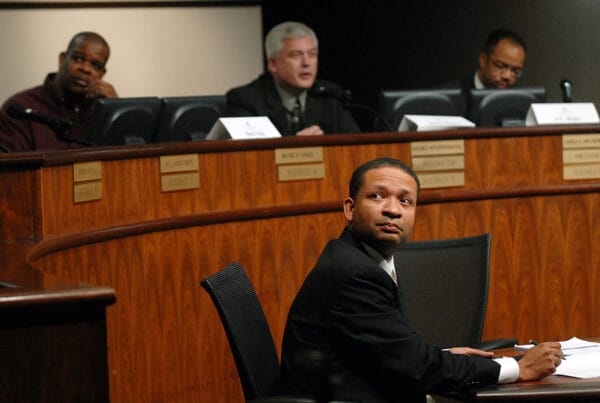 Artur Davis
Davis did not seek reelection to the House and stated that he would retire from Alabama politics; Attorney Terri Sewell won the open seat. He left the state, accepted a fellowship at the Harvard Institute of Politics, wrote for the conservative National Review, and joined a Washington, D.C., law firm. Davis controversially switched to the Republican Party in May 2012 and began speaking out against Obama and the Democratic Party as being too liberal. This move sparked much debate over whether the switch was consistent with Davis’s centrist ideals, or whether he was simply frustrated over losing the governor’s race. Davis endorsed Republican presidential candidate Mitt Romney in the 2012 presidential race and gave a prime-time speech in support of Romney at the Republican National Convention, earning additional scorn from Democrats. Since the 2012 campaign, Davis expressed interest in continuing to work outside of government and considered running for office as a Republican in Northern Virginia. He has also had numerous speaking engagements among Republican groups. After returning to Alabama, in 2015 Davis was a candidate for mayor of Montgomery, finishing a distant second behind Todd Strange. Soon after, he stated to the press that he was rejoining the Democratic Party. In 2016, Davis was named executive director of Legal Services Alabama, a federally funded organization that works to provide legal assistance to low-income people in Alabama. Davis again sought the Montgomery mayoral office in the 2019 race to replace Strange, but fared poorly in the crowded field.
Artur Davis
Davis did not seek reelection to the House and stated that he would retire from Alabama politics; Attorney Terri Sewell won the open seat. He left the state, accepted a fellowship at the Harvard Institute of Politics, wrote for the conservative National Review, and joined a Washington, D.C., law firm. Davis controversially switched to the Republican Party in May 2012 and began speaking out against Obama and the Democratic Party as being too liberal. This move sparked much debate over whether the switch was consistent with Davis’s centrist ideals, or whether he was simply frustrated over losing the governor’s race. Davis endorsed Republican presidential candidate Mitt Romney in the 2012 presidential race and gave a prime-time speech in support of Romney at the Republican National Convention, earning additional scorn from Democrats. Since the 2012 campaign, Davis expressed interest in continuing to work outside of government and considered running for office as a Republican in Northern Virginia. He has also had numerous speaking engagements among Republican groups. After returning to Alabama, in 2015 Davis was a candidate for mayor of Montgomery, finishing a distant second behind Todd Strange. Soon after, he stated to the press that he was rejoining the Democratic Party. In 2016, Davis was named executive director of Legal Services Alabama, a federally funded organization that works to provide legal assistance to low-income people in Alabama. Davis again sought the Montgomery mayoral office in the 2019 race to replace Strange, but fared poorly in the crowded field.
Further Reading
- Ifill, Gwen. The Breakthrough: Politics and Race in the Age of Obama. New York: Doubleday, 2009.
- Carson, Mike. “Former Alabama Congressman Artur Davis Has New Job”. Al.com, December 7, 2016; http://www.al.com/news/birmingham/index.ssf/2016/12/former_alabama_congressman_art.html
- McIlwain, Charlton, and Stephen Caliendo. Race Appeal: How Candidates Invoke Race in U.S. Political Campaigns. Philadelphia: Temple University Press, 2011.
